|
|
|
Sort Order |
|
|
|
Items / Page
|
|
|
|
|
|
|
| Srl | Item |
| 1 |
ID:
140386
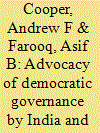

|
|
|
|
|
| Summary/Abstract |
This article examines the patterns of consistency and inconsistency between how India and China advocate democratisation at the global and national levels. Addressing this question through a dualistic framework, we develop a detailed map of the rhetorical promotion of democratic governance by India and China through an analysis of 10 years of foreign affairs speeches, remarks, interviews and statements of political elites of both countries. The article argues that although China has not shied away from declarations on democracy domestically as well as on global governance, the contradictions between the clear and consistent push for democracy and equity at the global level and the highly contingent commitment to democracy at the national level remain highly salient. India’s deficiencies, by way of contrast, come not in the domain of legitimacy but effectiveness. India’s struggle to translate its domestic democratic credibility into more equitable representation at the global institutional level and into a stellar economic model at the domestic level exposes it to criticism in relationship to China. Yet, even with these gaps, the article concludes that India has some comparative advantages over China precisely because it can play a consistent two-level game in terms of the promotion of democracy both at global and state levels.
|
|
|
|
|
|
|
|
|
|
|
|
|
|
|
|
| 2 |
ID:
091486
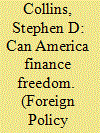

|
|
|
|
|
| Publication |
2009.
|
| Summary/Abstract |
Recent discourse on U.S. efforts to promote democracy has focused on military activities; especially the strategic and normative perils of democracy promotion at the point of bayonets. This paper explores the United States' use of economic statecraft to foster democratization, with particular attention to democracy incentive and assistance strategies. Incentive approaches attempt to promote democracy from the top-down, by leveraging aid and trade privileges to persuade authoritarian leaders to implement political reform. Assistance approaches aim to induce democratization from the inside, through funding and technical assistance to state institutions, and from the bottom-up, by providing support to civil society and elections. This study finds that while top-down incentive approaches can stimulate democratic change, this strategy tends to work only when aid and trade benefits are conditional; that is, when benefits are withheld until recipient states meet rigorous democratic benchmarks. Washington has historically eschewed democratic conditionality, however, and thus can claim very few aid-induced or trade-induced democratization events. Scant evidence exists to demonstrate that inside approaches-that is, institutional aid-possesses significant capacity to induce democracy. It is the bottom-up approach-empowering the masses to compel democratic change-that has registered the greatest number of democracy promotion successes.
|
|
|
|
|
|
|
|
|
|
|
|
|
|
|
|
| 3 |
ID:
108105
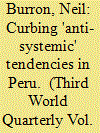

|
|
|
|
|
| Publication |
2011.
|
| Summary/Abstract |
Critical scholars and investigative journalists have developed a significant body of evidence demonstrating how US democracy assistance programmes undermine left and centre-left governments in Latin America. This article draws upon original research to examine how democracy promotion has sought to stabilise neoliberal polyarchy in Peru, a longtime regional ally of the US. It contributes to a neo-Gramsican theorisation of democracy programmes by examining how 'soft' tactics have contributed to the state's efforts at creating an inclusive neoliberal social order, a project which has ultimately failed. Particular attention is paid to the way in which US programmes were configured and carried out to respond to the rise of the 'anti-systemic' Peruvian nationalist party of Ollanta Humala, who won the recent presidential elections in June 2011.
|
|
|
|
|
|
|
|
|
|
|
|
|
|
|
|
| 4 |
ID:
092089
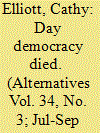

|
|
|
|
|
| Publication |
2009.
|
| Summary/Abstract |
The current fashion for good governance and promoting democracy as an integral element of development is ironically having depoliticizing effects because of its articulation with a technocratic and Westernized vision of what a good society might be like. Proceeding empirically and using texts relating to the assassination of Benazir Bhutto, this article demonstrates how discourses of democracy and development are mobilized in the contemporary international space, enabling the discursive taking of sides: for "democratic development" and against "Islamic extremism," in ways that elide other possible modes of seeing. "Democratic development" constitutes, and is constituted by, a "Western" (and British) identity in ways that are seductive, but also disciplinary: In particular, they turn out to produce and reproduce a particular set of gender relations as well as exhorting British Muslims to "fit in" with this identity. This exclusionary logic also transposes struggle over these power relations into an undemocratic international space. One key consequence of its mobilization is precisely the closing down of space for political resistance through democratic means, which I argue is not only ironically highly undemocratic, but also dangerous.
|
|
|
|
|
|
|
|
|
|
|
|
|
|
|
|
| 5 |
ID:
080907
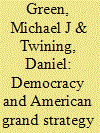

|
|
|
|
|
| Publication |
2008.
|
| Summary/Abstract |
Has democracy promotion been discredited as a central theme of American foreign policy after the US experience in Iraq? Many American critics and friends overseas appear to believe so. It would be wrong, however, to believe that the ideational approach of American foreign policy will diminish, particularly in Asia. First, there is not in fact a tension between the United States' material power and its ideals as a democracy. Second, post-Bush leaders identify and embrace the promotion of bilateral and multilateral cooperation among Asia-Pacific democracies as central to the United States' regional strategy. Third, and most important, democracy promotion and security cooperation among like-minded democracies will remain a central objective of American foreign policy in Asia because those elements magnify American power and facilitate US goals. In short, the ideational balance of power in Asia directly affects the material balance of power. This article examines these trends in American policy in Asia, the outlook for greater strategic and diplomatic cooperation among regional democracies, and the implications for the region, including China and ASEAN, of a US democracy-based approach to Asia policy.
|
|
|
|
|
|
|
|
|
|
|
|
|
|
|
|
| 6 |
ID:
099137
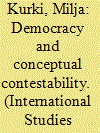

|
|
|
|
|
| Publication |
2010.
|
| Summary/Abstract |
Democracy is a deeply contested concept: historically, complex debates have revolved around the meaning of democracy and the plausibility of different 'models of democracy.' However, democracy's conceptual contestability has received diminished attention in the post-Cold War democracy promotion debate as the attention of democracy promotion actors and scholars has turned to fine-tuning of policies through which a liberal democratic model can be successfully encouraged. It is argued here that the focus on the extension of the reach of the liberal democratic mode of governance has resulted in a conceptually impoverished appreciation of the multiple meanings that the idea of democracy can take. It is argued that the 'essential contestability' of the idea of democracy is not adequately recognized and tackled, which in turn has important effects for the ability of democracy promotion scholars, as well as practitioners, to take into account the consequences that considering alternative (non- or extra-liberal) models of democracy might have for democracy promotion. To move the debate forward, I explore here, primarily in conceptual and theoretical terms, what serious engagement with the essential contestability of democracy might mean for democracy promotion. I argue that it entails a two-fold move: 'pluralization' and 'contextualization' of the conceptions of democracy. The latter part of the article examines in detail the reasons that might exist for considering such a move in framing the study and the practice of democracy promotion, as well as the potential dangers that might be involved.
|
|
|
|
|
|
|
|
|
|
|
|
|
|
|
|
| 7 |
ID:
088902
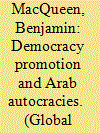

|
|
|
|
|
| Publication |
2009.
|
| Summary/Abstract |
This article explores the intersection between the policy of democracy promotion and the political dynamics of change in the Arab world. Based on extensive field research, this article unpacks the resilience of Arab regimes, asking the question: has the policy of democracy promotion assisted in the maintenance of autocratic and authoritarian regimes in the Arab world? Here, it is argued that the democracy promotion policy of the George W. Bush administration has enabled autocratic and authoritarian regimes across this region to enhance their capacity for social penetration and to exploit a lack of effort to promote the idea of democracy, facilitating direct and indirect modes of repression against opposition forces that have drawn from democracy promotion funding. This has enabled these regimes to enhance the processes of elite change, co-option and imitative institution building that have been central to their resilience in the face of seemingly unavoidable challenges.
|
|
|
|
|
|
|
|
|
|
|
|
|
|
|
|
| 8 |
ID:
139390
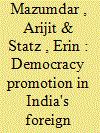

|
|
|
|
|
| Summary/Abstract |
Democracy promotion has never been an integral element of India's foreign policy. The pursuit of its national interests in the international arena has traditionally revolved around security, trade, and energy issues. This article demonstrates, however, that in recent times India has taken a more active stance in promoting and supporting democracy abroad. It identifies the specific ways in which India has engaged in democracy promotion and support abroad. Nevertheless, ‘realist’ concerns about strategic and economic interests, namely India's desire to improve its relationship with the United States and enhancing its status as an emerging power, rather than any idealistic commitment to democracy, may help explain this behavior. The pursuit of traditional foreign policy objectives will continue to take precedence over democracy promotion and support abroad. As such, there are elements of both continuity and change observed regarding the issue of democracy promotion in India's foreign policy.
|
|
|
|
|
|
|
|
|
|
|
|
|
|
|
|
| 9 |
ID:
128789
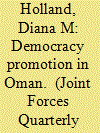

|
|
|
| 10 |
ID:
183909
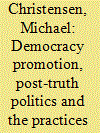

|
|
|
|
|
| Summary/Abstract |
Disinformation and other forms of post-truth politics are clearly a threat to global democracy. One way to better understand this post-truth moment is to re-examine the recent history of how political actors have tried to build or defend democratic institutions. This article turns to the field of international democracy promotion to examine the problem of legitimacy and trust in democratic institutions. While it has evolved from its late Cold War roots in pro-democracy propaganda campaigns, democracy promotion has increasingly become a field of expert knowledge aimed at professionalizing or improving the capacity of democratic institutions. This research follows the recent practice turn in IR theory to examine how expert knowledge is enacted through everyday organisational practices and argues that the recent rise of post-truth politics was not coincidental to the professionalisation of the field. Through interviews, ethnographic research, and document analysis of North American democracy promotion organisations, the following presents an analysis of contemporary democracy promotion as a set of practices emerging out of a global backlash against democracy that started in the early 2000s. The findings of this research suggest that performances of expertise in this field tend to be de-politicised, indeterminate, and narrowly focused on institutional legitimacy.
|
|
|
|
|
|
|
|
|
|
|
|
|
|
|
|
| 11 |
ID:
124776
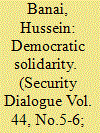

|
|
|
|
|
| Publication |
2013.
|
| Summary/Abstract |
This article aims to temper the cross-disciplinary enthusiasm for democracy-promotion programs in the light of the recent anti-authoritarian upheavals in the Middle East. It offers a wide-ranging critique of mainstream instrumentalist arguments (i.e. that democracy leads to peace, development, and justice), which are hampered by universalist generalizations about democratic government - in other words, by a tendency to separate democratic values and institutions from their orientation within particular political and historical contexts. In the place of such arguments, it offers an alternative model of democratic solidarity premised on the belief that the social construction of democratic norms - and especially the reflective processes that mediate their internalization - has a direct bearing on the legitimacy of political forms and decisions. Through a detailed analysis of the trials and tribulations of US democracy-promotion programs in the Arab and Muslim world, it further argues that the provision of any outside assistance to democratic transitions in the Middle East will need to involve the twin tasks of understanding the quite complex and contextual struggle for rights and freedoms in each particular society, and providing the necessary space and resources for achieving democratic legitimacy.
|
|
|
|
|
|
|
|
|
|
|
|
|
|
|
|
| 12 |
ID:
183898
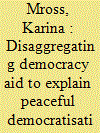

|
|
|
|
|
| Summary/Abstract |
Democratisation is hailed as a pathway to peace by some, yet, blamed for provoking renewed violence by others. Can democracy aid explain the effect of democratisation after civil war? Building upon findings that transitions to democracy are prone to violence, this article shows that external democracy aid can mitigate such negative effects. It is the first to disaggregate democracy aid and analyse its effect on peace after civil war. To this end, it uses a configurational approach and focuses on support for competition (for example, promoting free and fair elections), institutional constraints (for example, strengthening the judiciary), and cooperation (for example, facilitating reconciliation). Combining Qualitative Comparative Analysis (QCA) with an illustrative case study on Liberia, it demonstrates that democracy aid can help to prevent recurrence during postconflict democratisation. Two pathways can explain peaceful democratisation: first, fostering ‘cooperative democratisation’ characterised by substantial support for cooperation in lower-risk contexts; and second, fostering ‘controlled competition’ by combining substantial support for institutional constraints and competition. Importantly, democracy support does not trigger renewed violence. These findings speak to the academic debate on the destabilising potential of democratisation processes after civil wars and inform policymakers designing postconflict support strategies.
|
|
|
|
|
|
|
|
|
|
|
|
|
|
|
|
| 13 |
ID:
153904
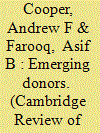

|
|
|
|
|
| Summary/Abstract |
This paper examines the evolving pattern of democracy promotion by three emerging donors: India, Brazil and South Africa. It first asks how the emerging donors promote democracy through their development assistance. The paper argues that despite the risk of compromising security and trade interests, the emerging donors have adapted to a 2 × 2 (two by two) model of democracy promotion by which they circumvent risk by promoting procedural democracy through bilateral means and non-procedural democracy through multilateral frameworks. Second, the paper asks why these three countries exhibit the same pattern of democracy promotion in spite of not having coordination among them. In response, the paper provides a structure–agent explanation. The paper contends that the structural constraints imposed on emerging donors are conducive to the operation of the 2 × 2 model in promoting democracy. While the model safeguards the emerging donors from criticism of being undue interveners in other countries' domestic affairs, it also privileges them with international recognition for being responsible partners in democracy promotion.
|
|
|
|
|
|
|
|
|
|
|
|
|
|
|
|
| 14 |
ID:
172237
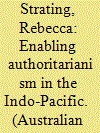

|
|
|
|
|
| Summary/Abstract |
In recent white papers, Australia has identified rising authoritarianism in the region as a key challenge to its regional security interests. Foreign policy discourses highlight Australia’s normative commitment to global democracy, and Australia engages in a range of democratic promotion activities. Democracy promotion by Western states has come under scrutiny by analysts of different ideological persuasions. Critics have framed American ‘exceptionalism’ as really meaning ‘exemptionalism’, referring to its capacities to create exceptions for itself and its own conduct on the global stage, particularly regarding democracy and human rights. This paper argues that this exemptionalism is not limited to the United States: Australia also engages in practices that have undermined its democracy promotion principles. In some cases, Australia’s policies have enabled authoritarianism to flourish unchecked. This paper uses Australia’s refugee policy and its effect on the small Pacific Island state of Nauru as a case study. It highlights how the securitisation of asylum seekers for electoral purposes has contributed to Australia carving out an exception for itself in both adherence to international refugee law and the promotion of democracy. It finds that formal democratic processes within Australia have produced undemocratic outcomes in foreign policy.
|
|
|
|
|
|
|
|
|
|
|
|
|
|
|
|
| 15 |
ID:
187027
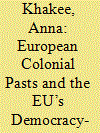

|
|
|
|
|
| Summary/Abstract |
How is EU democracy promotion made compatible with European colonial powers’ recent history of quashing democratic and human rights? A discourse analysis of general programmatic EU statements and texts related to selected salient historic junctures – the Algerian Hirak, the 2018 Democratic Republic of Congo elections and the Arab Uprisings – reveals that EU policy-makers reconcile the colonial past and the democracy-promoting present mostly through a silencing of colonialism. The consequence is that colonial-time hierarchical discourses are left undisturbed. Moreover, the projection of peace, democracy and the rule of law becomes not only the oft-noted break with the past, but also a continuity with colonial discourses of Europeans as ‘democratic’, ‘humanitarian’ and ‘civilised’.
|
|
|
|
|
|
|
|
|
|
|
|
|
|
|
|
| 16 |
ID:
153910
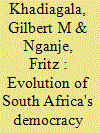

|
|
|
|
|
| Summary/Abstract |
South Africa is an emerging power with fairly strong democratic institutions that were crafted during the transition from minority to majority rule twenty years ago. How has South Africa used its position and power to promote democracy in Africa? Against the backdrop of debates on democracy promotion by emerging powers, this article probes attempts by successive post-apartheid governments to promote democracy in Africa. We argue that although democracy promotion featured prominently in South Africa's policy towards Africa in the immediate post-apartheid period under Nelson Mandela, the administrations of Thabo Mbeki and Jacob Zuma faltered in advancing democratic norms. This is largely because South Africa has confronted pressures to maximize pragmatic national interests, which have compromised a democratic ethos in a continental environment where these values have yet to find steady footing.
|
|
|
|
|
|
|
|
|
|
|
|
|
|
|
|
| 17 |
ID:
105358
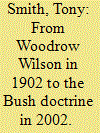

|
|
|
|
|
| Publication |
2011.
|
| Summary/Abstract |
The secular notion of American exceptionalism divorced from explicit racial or religious expression and based on governmental institutions and civic virtue - America as 'the last, best hope of earth' (Lincoln), America as 'the ark of the liberties of the world' (Melville) - goes back to the American Revolution. Nevertheless, before Wilson the conceptual framework that could explain the rightness of American global expansion in terms of bringing democratic government to others had not been well formulated. With Wilson, by contrast, the United States for the first time could present in secular terms, concepts argued from a cultural and historical perspective that made the expansion of American influence around the globe legitimate, not only in terms of national security but to the benefit of all mankind. Here is the key, I would propose, to the self-confidence and self-righteousness, which has been the hallmark of American foreign policy for a century now. Democracy promotion (associated with open markets economically and multilateralism) reflected America's cultural superiority (inherited from racial thinking), as well as its mission to help others (descended from its religious background). In Wilson's hands, an enduring framework for American foreign policy was born, one that remains with us to this day.
|
|
|
|
|
|
|
|
|
|
|
|
|
|
|
|
| 18 |
ID:
122820
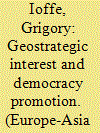

|
|
|
|
|
| Publication |
2013.
|
| Summary/Abstract |
To become successful, the American policy of promoting democracy abroad needs to be scaled down and decoupled from geopolitics. In the post-Soviet world, the democracy-geopolitics doublespeak breeds cynicism and achieves mixed results at best. Particularly discouraging are the outcomes of democracy promotion in the so-called cleft countries, straddled by a cultural divide. In Ukraine, American foreign policy achieved some success at the price of intensifying inter-regional antagonisms, which subsequently compromised and offset the progress that had been achieved in democratic forms of governance. In Belarus, democracy promotion failed altogether because inter-regional antagonisms in that country are too modest and are therefore difficult to leverage.
|
|
|
|
|
|
|
|
|
|
|
|
|
|
|
|
| 19 |
ID:
086349
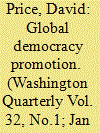

|
|
|
|
|
| Publication |
2009.
|
| Summary/Abstract |
A professed commitment to worldwide democracy promotion has been a hallmark of U.S. foreign policy for many years and was given a distinctive emphasis by the outgoing administration. President George W. Bush calls it "the urgent requirement of our nation's security, and the calling of our time."1 Promoting democracy, however, is not merely a matter of advocacy via an international megaphone. Policies of the Bush administration have led many to question the methods used to promote democracy or even the goal itself. Despite such criticism, much of it warranted, democracy promotion remains a central plank of U.S. foreign policy, an expression of U.S. values, and a tool that can be used to pursue the strategic interests of the United States. It is critically important, therefore, to learn from the mistakes of the past seven years and to rethink and refine the theory and practice of democracy promotion.
|
|
|
|
|
|
|
|
|
|
|
|
|
|
|
|
| 20 |
ID:
108094
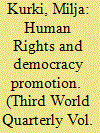

|
|
|
|
|
| Publication |
2011.
|
| Summary/Abstract |
This contribution seeks to engender more nuanced reflection on the role of human rights advocacy and specifically its role in democracy promotion. The two agendas have been seen as conjoined and harmonious by most aid donors; yet, interestingly and perceptively, some commentators have recently criticised the notion that they are agendas that are straightforwardly compatible or coherent. I examine here from a theoretical perspective the plausibility and the consequences of the claim that the two agendas share a more complex and controversial relationship than is often assumed. Specifically, I seek to highlight the importance of paying attention to the possibility that rights themselves are inherently 'contradictory' in nature and that therein lies their contribution to the democratisation agenda. Indeed, by drawing on Samuel Bowles's and Herbert Gintis's view of rights claims as 'clashing' and 'politico-economically' grounded, the aim of this article is to argue for a more politicised and openly contradiction-accepting approach to rights and democracy promotion. I contextualise this (theoretically motivated but practically consequential) argument in the context of the EU's human rights and democracy promotion policies.
|
|
|
|
|
|
|
|
|
|
|
|
|
|
|
|
|
|
|
|
|